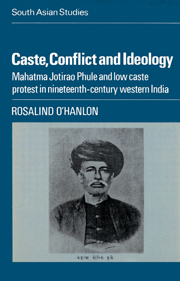 Caste, Conflict and Ideology
Caste, Conflict and Ideology Book contents
- Frontmatter
- Contents
- Acknowledgements
- Notes on translations and area under study, with map
- Part 1 Introduction
- Part 2 Religion and society under early British rule
- Part 3 Jotirao Phule and his circle: the emergence of a distinctive radical voice
- Part 4 The creation of a lower caste identity in history and popular culture, 1869–73
- Part 5 The lower caste community in contemporary society
- 11 Religious emancipation and political competition
- 12 Social protest and the construction of a religious ethic
- 13 Traditional privileges and new skills: Phule's analysis of the nature of Brahman power
- 14 The Satyashodhak Samaj in the 1870s
- Part 6 Ideology and the non-Brahman movement in the 1880s
- Bibliographic note
- Bibliography
- Glossary
- Index
11 - Religious emancipation and political competition
from Part 5 - The lower caste community in contemporary society
Published online by Cambridge University Press: 14 October 2009
- Frontmatter
- Contents
- Acknowledgements
- Notes on translations and area under study, with map
- Part 1 Introduction
- Part 2 Religion and society under early British rule
- Part 3 Jotirao Phule and his circle: the emergence of a distinctive radical voice
- Part 4 The creation of a lower caste identity in history and popular culture, 1869–73
- Part 5 The lower caste community in contemporary society
- 11 Religious emancipation and political competition
- 12 Social protest and the construction of a religious ethic
- 13 Traditional privileges and new skills: Phule's analysis of the nature of Brahman power
- 14 The Satyashodhak Samaj in the 1870s
- Part 6 Ideology and the non-Brahman movement in the 1880s
- Bibliographic note
- Bibliography
- Glossary
- Index
Summary
The performance of any religious ceremony by a Brahman priest for a member of another caste expresses in a concrete form the relations of purity between them which make up the basis for Hindu religious hierarchy. It is the Brahman priest alone who, in his ritual purity, has the power to mediate between the human world and that of the high gods, and so who controls the entry of divine power into the world. Ritual not only represents the broader relationship between Brahmans and others, but actively affects relationships within communities themselves. It is in ritual that the divine power is invoked to sanction the acts of individuals, such as marriage, which become thereby a part of the public structure of the community and contribute to its unified moral life.
For both of these reasons, Phule felt that the employment of Brahman priests negated the very principle upon which he hoped a community of the lower castes would be based. In the two chapters that follow this one, we will be looking at the arguments that he put forward to persuade his audiences of the downright moral evils of existing practices, and of the need for them to perform their own ceremonies if they wished to restore some purity to their religion.
This desire for independence in religion formed one of the main impulses behind the formation of the Satyashodhak Samaj, or ‘Truth-Seeking Society’ set up by Phule and other radicals in 1873.
- Type
- Chapter
- Information
- Caste, Conflict and IdeologyMahatma Jotirao Phule and Low Caste Protest in Nineteenth-Century Western India, pp. 189 - 192Publisher: Cambridge University PressPrint publication year: 1985
